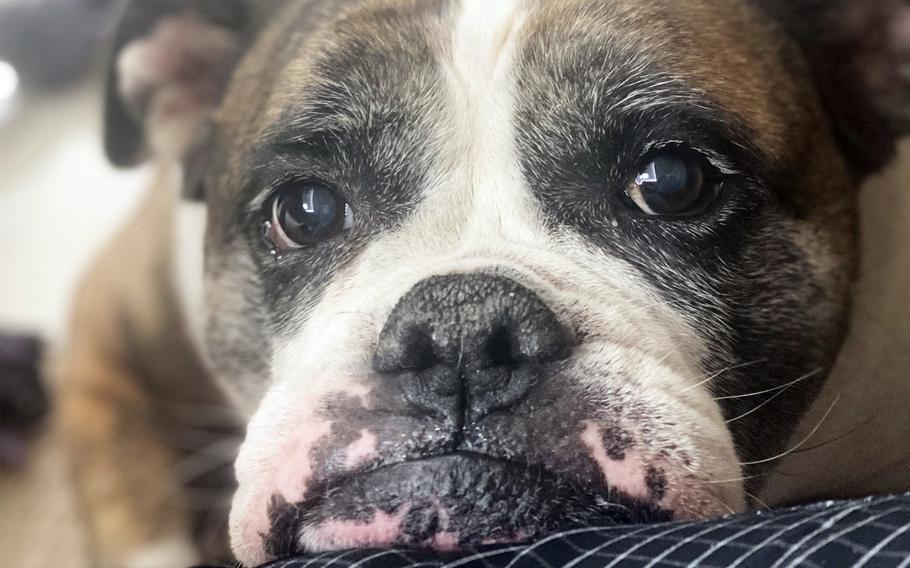
Winter, an 11-year-old Old English bulldog, died of heatstroke on a Patriot Express flight between Misawa Air Base, Japan, and Seattle. (Anne Surette)
TOKYO — A Defense Intelligence Agency contractor and his wife lost their two dogs to heatstroke on a government-chartered flight recently, despite changes last year to ensure pets survived those journeys.
When Tim and Anne Surette arrived in Seattle on Aug. 17 after a long flight from Japan on the Patriot Express, they learned that Winter, their 11-year-old Old English bulldog, and Soju, a 5-year-old French bulldog, had died en route, Tim Surette told Stars and Stripes by phone Monday.
The Patriot Express is a government-chartered air service that moves service members, civilian employees and their families between overseas bases and the United States. It’s overseen by Air Mobility Command, headquartered at Scott Air Force Base, Ill.
The couple was moving from Yongsan Garrison in South Korea to Reston, Va., Surette said.
They last saw their dogs alive during a three-hour layover at Misawa Air Base, Japan, where they left the plane, walked the dogs and refilled their water bottles, he said.
When the couple returned to their seats, they noticed the air inside was incredibly hot. “I would say it was between 75 and 80 degrees the entire way,” Surette said.
“The flight attendants announced that as soon as we lifted off the temperature would drop, but it never did or it didn’t significantly,” he said. “Flight attendants passed water around three separate times to us while we were flying, but I did sweat the entire way. Because the cabin was not cool, I can't imagine that the cargo compartment was any cooler.”
The Surettes’ story went viral on social media shared by military communities accustomed to stories of pets succumbing to summer heat on flights between duty stations. Air Mobility Command in 2022 imposed a series of changes after four pets died of heat exposure on flights originating in Asia.
The July 1, 2022, death of Kolbie, a 10-year-old Pomeranian mix, on a Patriot Express flight to Okinawa sparked an online campaign by military pet owners for change.
Air Mobility Command responded by allowing traveling pets into climate-controlled terminals when outside temperatures reach 85 degrees F.
The command also cautioned owners of short-nosed dogs like bulldogs that their pets are at higher risk of heatstroke. Their facial structure is less effective at cooling them down through panting, according to PetEducate.com.
Air Mobility Command has not responded to questions sent via email Monday. Command spokesman Lt. James Stewart said Tuesday by email that authorities at Joint Base Pearl-Harbor Hickam in Hawaii and at Misawa Air Base were collecting information and planned to respond Wednesday.
A spokeswoman, Jessica Brown, said Wednesday by email the command may respond by Thursday.
Winter and Soju were part of the Surettes’ family since they were puppies, Anne Surette said. Winter was the “queen” of the house and Soju was “the baby.”
“When Tim came and told me that they passed, I didn't want to believe him,” she said. “When I went to go see them, they looked like they were sleeping. I laid with them, just hoping they would wake up.”